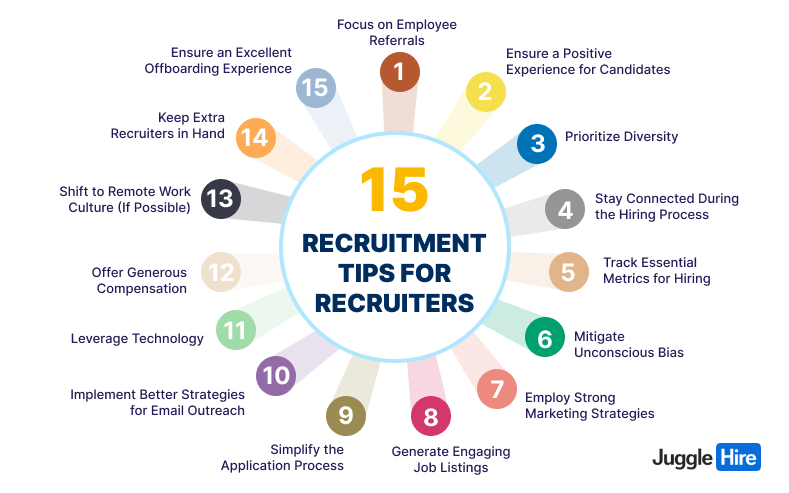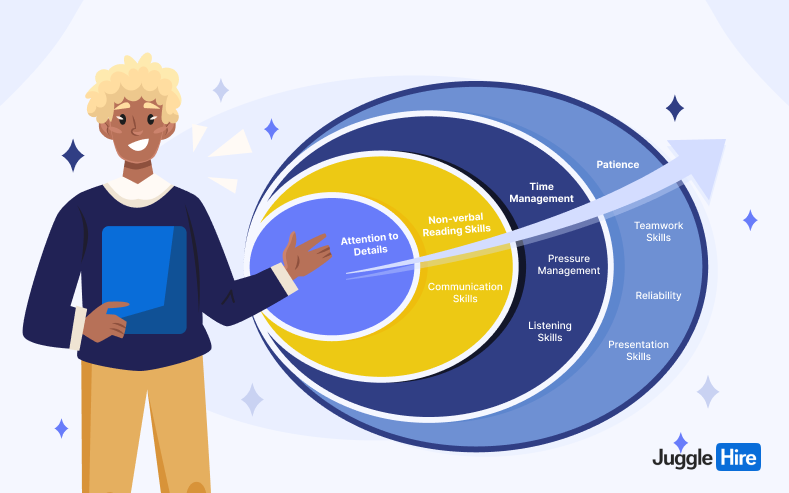15 Killer Recruitment Tips for Recruiters

Recruiting top talent is the lifeblood of any successful business. Whether you’re a new recruitment agency or an established firm, mastering the art of attracting and retaining the best candidates is key to your success.
In today’s competitive job market, having a solid recruitment strategy can make all the difference. It can help you find the right individuals to drive your company forward. You need to learn the recruitment tips for handling the challenges of talent acquisition and building a powerhouse team.
With that in mind, we’ll explore 15 recruitment tips for recruiters. These tips will equip you with the tools and techniques needed to excel in the ever-evolving world of recruitment. Keep reading!
Why Do You Need Effective Recruitment?

Effective recruitment is crucial for businesses aiming to secure top talent efficiently. It’s more than just finding the right person; it’s about optimizing the process to save time and money while enhancing the company’s reputation.
Recruitment involves various stages, from crafting job specifications to sifting through numerous resumes and conducting interviews. However, tight schedules, budget constraints, and competing priorities often complicate this process for hiring managers.
To navigate these challenges, recruitment tips for recruiters and hiring managers are invaluable. These include leveraging recruiter tips and tricks, utilizing methods of recruitment, and even seeking assistance from specialist recruitment consultancies.
Partnering with external agencies can expedite the process, alleviate stress, and ensure smooth operations. Despite skepticism surrounding external agencies, the benefits of their expertise in streamlining recruitment and enhancing employer branding outweigh the costs.
In a nutshell, effective recruitment isn’t just about filling vacancies—it is about attracting, engaging, and retaining top talent while maintaining a positive candidate experience and a strong employer brand.
15 Recruitment Tips for Recruiters to Enable Effective Recruiting

Here are 15 recruitment tips for recruiters that can enhance the effectiveness of your recruitment process:
01. Focus on Employee Referrals
These are a powerful source of quality talent and can significantly reduce recruitment costs. Implement a robust referral program that incentivizes employees to refer candidates from their professional networks.
Offer various referral bonuses, such as financial rewards, social recognition, prizes, vacation perks, or additional benefits, to encourage participation. Cultivate a culture of appreciation for referrals to strengthen networking connections within the organization.
Moreover, leverage former employees who had positive experiences by implementing positive offboarding practices, encouraging them to refer highly qualified candidates.
02. Ensure a Positive Experience for Candidates
The candidate experience plays a crucial role in attracting top talent and enhancing the employer brand. Focus on providing a positive experience throughout the hiring process, from initial contact to final decision.
Promptly communicate with candidates, whether it’s to schedule interviews or provide updates on their application status. Personalize rejection emails to convey appreciation for their interest and encourage them to consider future opportunities.
If necessary, you can request interviews promptly for candidates who meet the criteria. It will demonstrate interest and respect for their time.
03. Prioritize Diversity
To build inclusive and innovative teams, prioritizing diversity in recruitment is essential. Implement initiatives to foster diversity, inclusion, and belonging throughout the recruitment process.
Train hiring managers and interviewers to recognize and mitigate biases that may influence decision-making. Establish a standard interview protocol to ensure fairness and consistency in evaluation. Consider adopting blind hiring practices to remove identifying information that could lead to bias.
Utilize assessments and data-driven evidence to assess candidates objectively. Don’t forget to promote transparency in the recruitment process.
04. Stay Connected During the Hiring Process
Maintaining engagement with candidates throughout the hiring process is critical. However, it is required for a positive candidate experience and successful recruitment outcomes. That’s why you need to keep track of candidate interactions leading up to interviews to ensure appropriate engagement levels.
Avoid overwhelming candidates with excessive communication or leaving them feeling forgotten. Monitor candidate feedback and recommendations to gauge satisfaction and adjust the recruitment process accordingly.
On top of that, assess the effectiveness of the screening process. For that purpose, analyze the percentage of interviews resulting in job offers. Plus, refine the process as needed to improve outcomes.
05. Track Essential Metrics for Hiring
Monitoring key performance metrics is essential for evaluating the effectiveness of the recruitment process. This approach will foster data-driven decisions. Track metrics such as time-to-fill, quality of hire, and candidate engagement rate to assess recruitment performance.
Analyze these metrics to identify areas for improvement. After that, optimize recruitment strategies accordingly. Use data insights to streamline processes, and enhance candidate experience.
Tracking these metrics will attract top talent more effectively. Regularly review and refine recruitment metrics to align with organizational goals. As always, continuously improve recruitment outcomes.
06. Mitigate Unconscious Bias
Unconscious bias can significantly impact hiring decisions. It can lead to a lack of diversity and inclusivity within organizations. To address this, recruiters should implement structured interviews that focus on job-related criteria. They should not rely on subjective impressions.
Objective assessment tools, such as skills tests and simulations, can help evaluate candidates fairly. Additionally, ongoing bias training is essential for recruiters to recognize and challenge their unconscious biases. This training should cover stereotype threat, affinity bias, halo effect, and similar topics.
Recruiters can create a more inclusive hiring process by proactively addressing unconscious bias. As a result, they can attract a diverse pool of candidates.
07. Employ Strong Marketing Strategies
Effective recruitment involves more than just posting job openings; it requires actively promoting the employer brand to attract top talent. Recruiters should develop a compelling corporate identity that showcases the organization’s values, culture, and employee benefits.
This can be achieved through a combination of branding efforts. Typically, this includes website content, social media presence, and employee testimonials. This way, recruiters can attract candidates who align with the organization’s values and aspirations. Ultimately, the company will become an employer of choice.
08. Generate Engaging Job Listings
Job listings serve as the first point of contact between candidates and the organization. They make it crucial to craft engaging and informative postings. Recruiters should carefully consider the language and tone used in job descriptions. Otherwise, the company’s culture and values won’t be reflected.
In addition, job listings should clearly outline job responsibilities and qualifications. They should also define the benefits to provide candidates with a comprehensive understanding of the role.
It is crucial to include details such as –
- Company location
- Remote work options
- Career advancement opportunities
This information can further attract qualified candidates who fit the position and organizational culture.
09. Simplify the Application Process
Lengthy and complicated application processes can deter qualified candidates from applying for positions. Recruiters should strive to streamline the application process. This approach will enhance candidate experience and increase completion rates.
Companies should design mobile-friendly application forms with minimal required fields. Utilizing software to auto-fill application forms based on resume submissions can save candidates time and effort.
Moreover, companies should send automated confirmation emails to applicants upon submission. They should provide reassurance and transparency throughout the application process.
10. Implement Better Strategies for Email Outreach
It is valuable for recruiters to connect with candidates, but it requires careful planning and execution to be effective. In this case, email outreach can help. Recruiters should personalize email messages to build a genuine connection with candidates. They must avoid generic or impersonal communication.
Short and concise subject lines are more likely to grab candidates’ attention and encourage them to open the email. It is a good practice to include a clear call to action in the email. For instance, scheduling an interview, providing additional information, or guiding candidates on the next steps.
By tracking response rates and analyzing analytics from tools (like Jugglehire), recruiters can refine their outreach strategies and improve candidate engagement over time.
11. Leverage Technology
Embrace digital recruiting tools to expand your reach and streamline the hiring process. Utilize social media platforms, email campaigns, and virtual job boards to connect with potential candidates, especially when face-to-face interactions are limited.
Consider participating in virtual employment events such as video conference career fairs to foster networking opportunities. Implement candidate selection platforms to automate the screening process and administer pre-employment assessments.
These assessments can evaluate candidates’ skills, certifications, and experience, allowing you to identify qualified candidates efficiently and advance them to the next hiring stage.
12. Offer Generous Compensation
Competitive compensation is a key factor in attracting top talent to your organization. Advocate for offering compensation packages that are equal to or surpass industry standards to remain competitive in the job market.
While monetary rewards are essential, consider offering non-monetary perks such as remote work options, flexible schedules, or additional benefits to appeal to candidates’ preferences. Brainstorm creative ways to enhance the overall compensation package to differentiate your organization and attract high-quality candidates.
13. Shift to Remote Work Culture (If Possible)
Embrace the trend of remote work culture to expand your talent pool and adapt to changing workforce preferences. Highlight your company’s effective remote work program as a selling point to attract candidates from diverse geographical locations.
Showcase the benefits of remote work, such as flexible schedules, increased productivity, and cost savings on commuting and office expenses. Position your organization as a forward-thinking employer that prioritizes work-life balance and embraces innovative work arrangements.
14. Keep Extra Recruiters in Hand
Consider augmenting your recruitment team with additional recruiters to accelerate the hiring process and reach a broader pool of qualified candidates. Assess your company’s growth trajectory and recruitment needs to determine if hiring more recruiters is feasible.
Conduct a budget analysis to evaluate the financial implications of expanding the recruitment team. Recognize that investing in recruitment is an investment in the future of the organization and can lead to attracting top-tier talent efficiently.
15. Ensure an Excellent Offboarding Experience
Pay attention to the offboarding process to maintain positive relationships with departing employees and leverage their potential as brand ambassadors and future rehires. Provide departing employees with a positive offboarding experience. This way, their contributions and appreciation for their time with the organization will be acknowledged.
Cultivate alumni networks to stay connected with former employees and tap into their referral networks. Recognize that past employees who had positive offboarding experiences are more likely to recommend the organization to others and potentially return in the future, bringing valuable skills and insights back to the company.
How To Be A Great Recruiter – 10 Skills and Qualities You Must Have

If you’re just starting your journey as a recruiter, you might be wondering what it takes to excel in this role and how to gauge your progress. Here are some essential skills and qualities that can set you on the path to becoming a great recruiter:
(I) Attention to Details: Paying attention to the smallest details can make a big difference in the recruitment process. From crafting job descriptions to evaluating candidates’ qualifications, being detail-oriented ensures nothing falls through the cracks.
(II) Non-verbal Reading Skills: Mastering the ability to interpret non-verbal cues can provide valuable insights into candidates’ thoughts and feelings during interviews. Understanding body language and facial expressions can help you assess candidate suitability more effectively.
(III) Communication Skills: Effective communication is the cornerstone of successful recruiting. Whether it’s conveying job requirements to candidates or providing feedback to hiring managers, clear and concise communication fosters understanding and collaboration throughout the hiring process.
(IV) Time Management: Recruiting often involves juggling multiple tasks and deadlines simultaneously. Strong time management skills enable you to prioritize tasks, allocate resources efficiently, and meet recruitment goals within established timelines.
(V) Pressure Management: Recruiting can be fast-paced and high-pressure, especially when faced with tight deadlines or demanding hiring managers. Developing strategies to stay calm and focused under pressure ensures that you can maintain productivity and make sound decisions even in challenging situations.
(VI) Listening Skills: Actively listening to candidates’ concerns, preferences, and qualifications is essential for building rapport and understanding their suitability for a role. Cultivating empathetic listening skills helps you connect with candidates on a deeper level and identify the best fit for both the candidate and the organization.
(VII) Patience: Recruitment is often a process of trial and error, requiring patience and perseverance to navigate setbacks and obstacles along the way. Patience allows you to remain resilient in the face of challenges and maintain a positive attitude throughout the recruitment journey.
(VIII) Teamwork Skills: Collaboration is key in recruitment, whether it’s working closely with hiring managers to define job requirements or coordinating with colleagues to streamline the hiring process. Strong teamwork skills facilitate effective communication, decision-making, and problem-solving within the recruitment team.
(IX) Reliability: Building trust and credibility with candidates, hiring managers, and colleagues is essential for success as a recruiter. Consistently delivering on commitments, following through on tasks, and maintaining confidentiality instill confidence in your abilities and foster strong professional relationships.
(X) Presentation Skills: Presenting job opportunities persuasively and articulately to candidates is crucial for attracting top talent. Whether it’s delivering engaging job descriptions or pitching the company culture and benefits, effective presentation skills enhance your ability to sell opportunities and secure the best candidates for the role.
How to Measure the Success of Your Recruitment When You Are New?

Measuring the success of your recruitment efforts when you’re new to the field is crucial for understanding your progress and identifying areas for improvement. Here are some Key Performance Indicators (KPIs) to track, along with additional measures to gauge your personal satisfaction and growth:
1. Number of Qualified Candidates per Open Role
Assess the quantity and quality of candidates who meet the criteria for each open position. Monitor the number of qualified candidates sourced through various channels, such as job boards, referrals, or networking events. Aim to increase the pool of qualified candidates to enhance the chances of making successful hires.
2. Completion Rate for Each Application
Track the percentage of applicants who complete the entire application process, including submitting required documents or completing assessments. A high completion rate indicates that candidates find the application process user-friendly and engaging, while a low completion rate may signal barriers or inefficiencies in the application process.
3. Time to Hire
Measure the time it takes from initiating the recruitment process to making a successful hire. Time to hire includes sourcing candidates, screening resumes, conducting interviews, and extending job offers. A shorter time to hire indicates an efficient recruitment process, while a longer time to hire may result in losing top candidates to competitors.
4. Cost of Hire
Calculate the total expenses incurred during the recruitment process, including advertising costs, recruitment software fees, and staff salaries. Divide the total cost by the number of hires made to determine the average cost per hire. Tracking the cost of hire helps evaluate the efficiency and cost-effectiveness of recruitment strategies and identifies opportunities to optimize expenses.
5. Conversion from Applicants to Hiring
Monitor the conversion rate of applicants who progress through each stage of the hiring process and ultimately receive job offers. Analyze factors that contribute to successful conversions, such as effective communication, timely follow-up, and alignment with job requirements. Identifying bottlenecks or drop-off points in the conversion process allows for targeted improvements.
6. Offer Acceptance Rate
Measure the percentage of job offers extended to candidates that are accepted. A high offer acceptance rate indicates that candidates perceive the offer as attractive and competitive, reflecting positively on the organization’s employer brand and recruitment process. A low acceptance rate may necessitate reevaluating compensation packages or addressing concerns raised by candidates during the offer stage.
7. Candidate Satisfaction
Gather feedback from candidates regarding their experience during the recruitment process. Use surveys or interviews to assess satisfaction with communication, transparency, and professionalism exhibited by recruiters and hiring managers. Positive candidate feedback indicates a positive employer brand and enhances the likelihood of attracting top talent in the future.
In addition to tracking these KPIs, it’s essential to reflect on your personal growth and satisfaction in your role as a recruiter. Consider the following measures:
| Personal Growth | Quality of Work | Passion for the Industry |
| Reflect on whether you feel challenged and stimulated by your role as a recruiter. Assess whether you’re acquiring new skills, expanding your knowledge of recruitment methods, and growing professionally. | Evaluate the quality of your recruitment efforts by reviewing feedback from hiring managers and colleagues. Consider whether you’re meeting or exceeding expectations in sourcing and selecting top talent for the organization. | Assess your level of enthusiasm and passion for the recruitment industry. Reflect on whether you’re genuinely interested in helping candidates find fulfilling careers and supporting organizational growth through effective talent acquisition strategies. |
FAQ on Recruitment Tips for Recruiters
01. What is the best way to impress a recruiter?
To impress a recruiter, show genuine enthusiasm for the position, company, and culture. Demonstrating sincere interest in learning more about the role and organization can make a positive impression. Recruiters appreciate candidates who are enthusiastic and committed, as it signals a potential mutual fit and interest in moving forward in the recruitment process.
02. What are the 7 stages of recruitment?
The 7 stages of recruitment are:
- Defining the position and the ideal candidate.
- Crafting the job advertisement.
- Searching for talent through various channels.
- Screening and shortlisting candidates based on qualifications and fit.
- Conducting interviews with selected candidates.
- Extending job offers to chosen candidates.
- Signing the contract and welcoming the new employee into the organization.
03. What do recruiters look at first?
Recruiters typically look at experience first when evaluating potential candidates. When reviewing resumes, they focus on the candidate’s most recent position within an organization and relevant work experience. Experience provides insight into a candidate’s qualifications and suitability for the role.
04. What is strategic recruiting?
Strategic recruiting involves utilizing skilled selling, employer branding, and recruitment marketing to attract and retain top talent. It focuses on sourcing the right candidates to meet the organization’s needs. Strategic recruiting aligns recruitment efforts with business goals and market demands to achieve long-term success in talent acquisition.
05. What is the 30-second rule for a resume?
The 30-second rule for resumes refers to the limited time recruiters spend reviewing each resume. In a competitive job market, recruiters often make quick decisions about whether to move a resume to the interview pile or reject it within 30 seconds. Therefore, it’s crucial for resumes to capture recruiters’ attention quickly.
Recruitment Tips for Recruiters – Key Takeaways for You
In the fast-paced world of recruitment, staying ahead of the curve is essential for success. Implement the 15 recruitment tips for recruiters outlined in this article. This way, you can be well-equipped to attract, engage, and retain top talent for your clients.
Remember, recruitment is not just about filling roles—it’s about building teams that drive innovation, productivity, and growth.
So, go forth with confidence, armed with these powerful tips, and watch your agency thrive in the competitive landscape of talent acquisition. Here’s to your continued success in the world of recruitment!

Well… I must say – some of the tips are killer! But I think ensuring an excellent experience for both onboarding and offboarding is crucial.
Indeed. But experts analyzed that maintain a superb offboarding experience works better than the onboarding experience.
I don’t think the title of your article matches the content lol. Just kidding, mainly because I had some doubts after reading the article.
Thanks, hope your doubt is clear now 🙂 If not, let me which part makes you confused.
Thanks for sharing. I read many of your blog posts, cool, your blog is very good.
Glad to know mate 🙂
Subscribe to our newsletter to find more blogs and know about our recruitment platform, JuggleHire
Your article helped me a lot, is there any more related content? Thanks!
Of course…click here for similar blogs like this one
https://jugglehire.com/blog